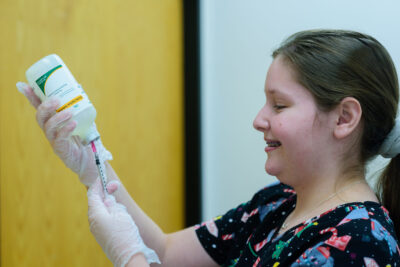By Dr. Meg Varner-Soden, DVM.
- Originally published in the December 23, 2022, edition of the Valley Advantage.
- https://www.thevalleyadvantage.com/community-columns/from-nose-to-tail-celebrating-the-unsung-heros/article_2657fe43-d5ae-5b22-92e2-12a97baacf22.html
In this month’s article, I would like to focus on one of the most amazing species I have had the pleasure to work with: licensed veterinary nurses, commonly known as LVNs!
This rare, underappreciated and misunderstood breed of human is why I joined the Veterinary Nursing Program at Johnson College. I love to help develop “Baby Vet Nurses” and reap the joy of watching them flourish.
The main difference between a licensed veterinary nurse and a non-licensed veterinary assistant is their level of education and training. Ideally, they have earned their degree(s) through an American Veterinary Medical Association-accredited college such as Johnson College. There are two-year associate’s degrees (such as we offer at Johnson College) and four-year bachelor’s degrees.
A veterinary nurse educational program is usually rigorous and requires a studious, conscientious, intelligent, hard-working and disciplined person with good interpersonal skills to complete.
Their coursework includes a plethora of math and science and covers a range of species, from tiny pocket pets to huge draft horses. Here is a sample of the classes taken: anatomy and physiology, chemistry, parasitology, immunology, microbiology, pharmacology, radiology and ultrasonography, as well as customer service courses.
Subsequently, they apply this book knowledge through clinical rotations (surgery and medicine), which provide supervised hands-on experiences while still students. Students must then complete a five-week internship in the field before earning their degree.
Upon completion of the academic program, they then sit for a National Boards Exam to earn their license. And it doesn’t stop there. Just like a veterinarian, LVNs are required to earn continuing education credits on a two- to three-year basis, depending on what state they are licensed in, to maintain their license.
Also, did you know that an LVN can become formally specialized? Currently, they can gain specialty credentials in one of sixteen focuses. Examples include emergency and critical care, dentistry, internal medicine, zoological medicine, behavior, dermatology and equine medicine.
A licensed vet nurse can do anything in a veterinary facility that is hands-on and technical, except for surgery, diagnosis and prescribing medications. Good bedside manner is also critical, considering that they are often among the first and last people a pet owner interacts with during a vet visit.
Here is a sampler list of things an LVN can do under the direction of a veterinarian:
- Prepare for and lead an anesthesia event, including monitoring a patient before, during and after a surgical procedure.
- Place intra-venous catheters, give injections by different routes and place endotracheal tubes and other gadgets.
- Draw blood/urine samples to run various diagnostic tests and report results to the veterinarian.
- Perform radiographs, ultrasound and sometimes even advanced imaging like CT scans and MRIs.
- Perform professional dental cleanings.
- Take measurements for the veterinarian — for example, eye pressures, dry eye tests, blood pressures, blood glucose readings, pulse oxygenation and electrocardiograms.
- Take various skin samples to be cultured or evaluated with the team under a microscope. A good LVN can readily identify pathogens and parasites and report findings to the vet.
- Administer certain booster vaccines and/or medications ordered by a vet. In complicated chronic diseases such as diabetes and Addison’s disease, LVNs are integral to your pet’s routine treatment and monitoring. Provide detailed take-home instructions when your pet is discharged from the clinic following a surgical procedure.
- Performs thorough record-keeping of all kinds. May serve as a practice manager and/or staff supervisor.
Finally, how can a pet owner better utilize a veterinary office’s licensed nurses?
When bringing your pet to the vet, please don’t assume your LVN doesn’t have enough expertise to hear about your pet’s history or field your questions. Too many owners wait for the veterinarian to enter the room before telling the whole story, and honestly, this is a disservice to your pet and not a wise use of your veterinary team’s time.
Never underestimate the superpowers your licensed veterinary nurse has! They enjoy being utilized and challenged. They love patient care and bonding with owners. Seasoned LVNs are an absolute treasure trove of wisdom – I still learn from them on a regular basis!
Dr. Meg Varner-Soden, DVM, is the veterinarian at the Johnson College Animal Care Center as well as an instructor for the Johnson College Veterinary Nursing Program. She has been practicing veterinary medicine for 12 years.

